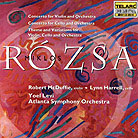July 2000
From the onset of the talkies in the late 1920s, many composers whose hearts were not in the new musical fashions ended up writing film music, and from 1933 onwards most of them worked in Hollywood. Miklos Rózsa was something of an exception; born in Hungary in 1907, he moved first to Paris then to London, where his film-music career began in earnest with a song for Marlene Dietrich. He only moved to the US in 1939, after the onset of war. Rózsa is best remembered today for his Academy Award-winning scores to Spellbound, A Double Life and, above all, Ben Hur. However, like his fellow émigrés, such as Korngold, Rózsa "kept his hand in" with concert music. Finally, the worth of his and others' non-film scores are being recognized. The Violin Concerto dates from 1953-54 and was written, like so many 20th century works, for the instrument for Jascha Heifetz, who premiered it in 1956. I am not, I confess, familiar with any previous work by violinist Robert McDuffie, but his playing here certainly makes me want to become so. The concerto demands a huge technique, hardly surprising given its dedicate, and a singing tone. Both of these McDuffie seemingly possesses in spades, together with an evident sympathy for Rózsa's idiom; he seems as much at home in the spectacular acrobatics of the outer movements as in the lyrical lento cantabile. The Cello Concerto was written for another Hungarian exile, Janos Stalker; it is a slightly darker work than the Violin Concerto, although not without its moments of humor -- one might almost say high camp, at a couple of points where the soloist swoops down from the stratosphere to his lowest register only to end with a cheeky pizzicato. Lynn Harrell is a better-known name (certainly to me) than McDuffie. His playing of Rózsa seems equally idiomatic and sensitive. The "Theme and Variations" is actually a revised version of the slow movement of a Concerto for Violin and Cello, written at the suggestion of Gregor Piatigorsky, for him and Heifetz to play. For various reasons, including professional rivalry between the proposed soloists, the "Theme and Variations" appeared in public before the concerto itself. The altered orchestration (among other details) earned it its unusual opus number. All three receive performances of stature, and it would be hard to imagine a more persuasive case being made for the music. Levi and the Atlanta Symphony accompany superbly, and the recording is of near-demonstration class. GO BACK TO: |
 Music of Miklos Rózsa
Music of Miklos Rózsa![[Reviewed on CD]](../format/regcd.gif) It was Dimitri Tiomkin who, in his 1954 Oscar acceptance speech for the music
to The High and the Mighty stood up and said "I'd like to thank Johannes
Brahms, Richard Wagner, Richard Strauss" and a whole slew of late-Romantic European
composers. Although Tiomkin's fellow European émigré composers were not particularly
amused by his witticism, it nevertheless contained an important grain of truth. In the
aftermath of World War I and with the growing influence of Arnold Schoenberg and the
Second Viennese School on the one hand, and Stravinskian-inspired neoclassicism on the
other, there wasn't much call (and certainly no money) for late Romanticism.
It was Dimitri Tiomkin who, in his 1954 Oscar acceptance speech for the music
to The High and the Mighty stood up and said "I'd like to thank Johannes
Brahms, Richard Wagner, Richard Strauss" and a whole slew of late-Romantic European
composers. Although Tiomkin's fellow European émigré composers were not particularly
amused by his witticism, it nevertheless contained an important grain of truth. In the
aftermath of World War I and with the growing influence of Arnold Schoenberg and the
Second Viennese School on the one hand, and Stravinskian-inspired neoclassicism on the
other, there wasn't much call (and certainly no money) for late Romanticism.